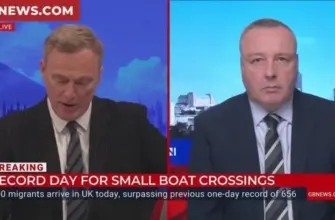The current approach to managing migration across The Channel seems destined for failure, echoing historical attempts to command natural forces. Instead of offering genuine solutions, it risks becoming a futile exercise akin to King Canute’s decree against the incoming tide. With public frustration mounting and political pressure intensifying, a comprehensive strategy is urgently needed to address this crisis.
The prevailing sentiment amongst voters reflects the urgency of the situation; simply voicing slogans will not suffice. To effectively “Stop the Boats,” the UK Government should look to successful models implemented elsewhere, notably Australia and Greece, who navigated their own migration challenges through systemic reform. These nations offer valuable lessons for a sustainable approach:
- Reduce Incentives: The current system inadvertently encourages illegal crossings by offering prospects of permanent settlement. Reforming immigration laws to eliminate pathways to long-term residency for those arriving via small boats or lorries is crucial, including restricting access to social housing and revisiting family reunion rights.
- Disrupt Criminal Networks: While disrupting the supply chains that facilitate these journeys – intercepting boat materials, tracking illicit financial flows, and prosecuting traffickers – is important, it’s not a standalone solution. Increased firmness with French authorities is essential, including proactively returning migrants from coastal waters, mirroring practices employed by the Belgian Coastguard. Future funding to France should be contingent upon demonstrable action against lawlessness in Pas-De-Calais and cooperation in detaining and repatriating individuals who refuse to seek asylum within France.
- Process Claims Swiftly: Streamlining asylum processing is paramount. Greece’s success in accelerating their system through the use of dedicated accommodation centers, rather than hotels, facilitated efficient interviews and quicker decisions. Simplifying rules, streamlining decision-making, and minimizing opportunities for appeals will reduce delays and deter those seeking to exploit the system.
- Enforce Deportation: Effective immigration law demands consequences for non-compliance. While judicial rulings have sometimes impeded removals, a more robust approach is needed. Exploring options beyond the European Convention on Human Rights could offer greater flexibility. Furthermore, international pressure must be applied; nations refusing to accept their citizens’ return should face repercussions such as visa restrictions, aid reductions, and tariffs. Establishing third-country agreements – mirroring Australia’s model – would enable the removal of individuals who cannot be returned directly to their home countries (e.g., Syrian refugees), effectively dismantling the people smuggling business model.
“The Small Boats Crisis is not insurmountable,” states a leading policy analyst, “but requires unwavering commitment and a willingness to leverage all available tools, from bolstering law enforcement to reconsidering outdated international commitments.” Failure to do so risks repeating the historical folly of ordering the tide to retreat – a strategy doomed to be overwhelmed by events.
The Government must prioritize ending this crisis or face being swept away by public discontent.







